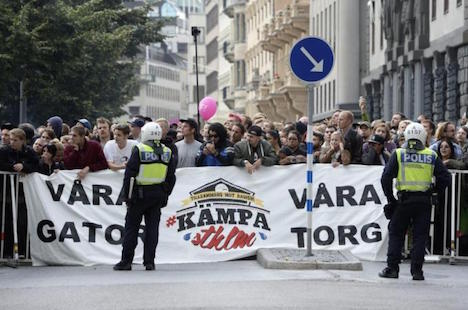|

|
Seeing Sweden's race problem for what it is
 Print This Print This
By Michael McEachrane, Al Jazeera
Al Jazeera
Sunday, Dec 28, 2014
 |
| Like the rest of Europe, Sweden prides itself in its constitutional tradition based on a 'respect for the equal worth of all and the liberty and dignity of the individual', writes McEachrane [EPA] |
Two things seem abundantly clear regarding the rise of ultranationalism in Europe today. First, it is symptomatic of a broader form of nationalism which all European states are steeped in. Second, it is this broader nationalism that ultimately needs to be confronted if equality is ever to become a reality in Europe.
Even in a country like Sweden, an ultranationalist party with roots in neo-Nazism is now the country's third largest party. Recently, the Sweden Democrats Party demonstrated its power by voting down the government budget. As a result, early national elections will be held in March 2015. The party has declared that it aims to bring down any government that refuses to drastically reduce immigration.
Sweden is a poignant example of the problem of nationalism in Europe today. It seems fair to say that in Sweden nationalism is not deemed a mainstream problem. Rather, it is seen as something that either belongs to the past or is an expression of extremism. The Sweden Democrats may have 13 percent of the electorate, but all other parties in parliament treat them as a national anomaly, isolated and kept at a safe distance.
It also seems fair to say that neither race nor even racism is seen as a mainstream problem in Sweden. As longtime Swedish Prime Minister Olof Palme summed it up in a Christmas speech in 1965: "Democracy is firmly rooted in this country. We respect the fundamental freedoms and rights. Murky racial theories have never found a foothold here. We like to see ourselves as open-minded and tolerant."
Race is seen as a misguided belief, which is why it is not to be found in the country's anti-discrimination legislation. And racism is a strong word reserved for extreme cases of prejudice and hostility. The majority, though, with good conscience can chant "No racists in our streets!", a popular slogan in recent demonstrations against the Sweden Democrats and neo-Nazism.
The result is a compounded problem of denying the prevalence of nationalism and racism and the urgent need for political measures to eliminate them. Beyond its anti-discrimination legislation - which merely has led to a trickle of convictions - Sweden has few political measures in place against racism. Instead, the political focus tends to be on the "integration" of immigrants in the form of education, job training programmes, access to citizenship and so on.
Marginalisation and exclusion
The pressure is now increasing to heed to the politics of the Sweden Democrats and focus more on integration. What this does is ignore the social significance of a national "us" versus a foreign "them". Like other European countries, Sweden is a nation-state with a long tradition of understanding nationhood in terms of ethnicity, race and culture. Like other ultranationalist parties across Europe, the Sweden Democrats capitalise on a growing sense of fear that this nation is under threat.
On the whole, judging from the patterns of discrimination and exclusion in European societies, it is all too clear that at the bottom of European divisions between a national "us" and a foreign "them" is race. In Sweden, traditional national minorities such as the Saami, Roma and Jews have a long history of being excluded from the Swedish nation. Today especially Saami and Roma are still highly marginalised. But like elsewhere in Europe, it is especially people of colour (the “visible minorities”, including Roma) that are most evidently discriminated against in every major area of society such as the housing and job markets.
The urban areas of Sweden are today spatially segregated along racial lines with people of colour concentrated to low-income housing projects. The country has the highest differences in employment in the West between native and foreign-born citizens and these differences are the most dramatic between ethnic Swedes and non-western born residents. People of African descent have a particularly hard time finding jobs, have the lowest educational payback in the country and are exposed to the most number of hate crimes.
To create a more inclusive society, counter such patterns and curb the rise of the Sweden Democrats, the traditional definition of the nation in terms of race and ethnicity needs to go. In addition, political measures against racism, and a consistent anti-discrimination perspective that includes race need to become mainstream.
Like the rest of Europe, Sweden prides itself in its constitutional tradition based on a "respect for the equal worth of all and the liberty and dignity of the individual", as its constitution says.
But as the UN Working Group of Experts on People of African Descent concluded on its visit to Sweden the same week that the Sweden Democrats forced the country into early elections:
"It is our view that the Swedish philosophy of equality and its public and self-image as a country with non-discrimination and liberal democracy, blinds it to the racism faced by Afro-Swedes and Africans in its midst. No country is free of racism and Sweden is not an exception."
Michael McEachrane is a member of the Swedish NGO and anti-racist collective Fight Racism Now (FRN) and the editor of Afro-Nordic Landscapes: Equality and Race in Northern Europe.
Source URL
|
 Print This Print This

|
If you appreciated this article, please consider making a donation to Axis of Logic.
We do not use commercial advertising or corporate funding. We depend solely upon you,
the reader, to continue providing quality news and opinion on world affairs. Donate here
|
 |
World News

|

